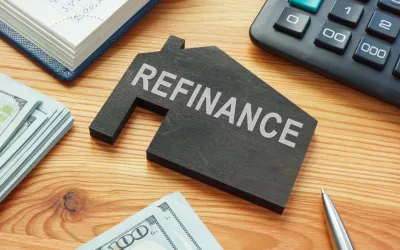Purchasing a new home is a big decision, and navigating the mortgage process can be intimidating, especially for first-time homebuyers. With so many options, processes, and factors to consider, it can be hard to know where to start. If you’re considering buying a home in Omaha, NE, it’s important to understand the mortgage process well. In this step-by-step guide, we will provide you with all the information you need to know about how to get a mortgage in Omaha. From pre-approval to closing, we will walk you through each step of the process and provide you with tips and advice to make your experience as smooth and stress-free as possible. So, whether you’re a first-time homebuyer or a seasoned pro, read on to learn how to navigate the mortgage process in Omaha, NE.
1. Understanding the Omaha, NE mortgage market
If you’re planning on purchasing a home in Omaha, NE, it’s important to understand the mortgage market in the area. With a population of over 400,000, Omaha is the largest city in Nebraska and boasts a thriving real estate market with plenty of options for home buyers.
Omaha has a diverse range of neighborhoods, each with its own unique charm and character, so it’s important to do your research and find the area that’s right for you. The median home value in Omaha is $289,800 in March 2023, making it an affordable option for first-time home buyers and those looking to upgrade their homes.
As for the mortgage market, plenty of options are available to borrowers in Omaha. Local mortgage brokers all offer a variety of mortgage products, including fixed-rate and adjustable-rate mortgages, FHA loans, VA loans, and jumbo loans.
Working with a local mortgage broker can be beneficial, as they have in-depth knowledge of the Omaha market and can help guide you through the process.
Overall, understanding the mortgage market in Omaha is key to successfully navigating the home-buying process in the area. Take the time to do your research, compare rates and terms, and work with a reputable lender or broker to find the best mortgage for your needs.
2. The difference between prequalification and preapproval
Before you start shopping for a home, you should understand the difference between prequalification and preapproval. Both can help you understand how much you might be able to borrow, but they are not the same thing.
Prequalification is a preliminary step in the mortgage process. It involves answering a few questions about your financial situation so that a lender can give you an estimate of how much you may be able to borrow. This estimate is not a guarantee that you will be approved for a loan, and it does not require a credit check or any verification of your financial information.
Preapproval is a more formal step in the mortgage process. It involves submitting a mortgage application and providing documentation to verify your income, assets, and debts. The lender will also pull your credit report to assess your creditworthiness. If you are preapproved for a mortgage, the lender will give you a specific loan amount and interest rate, which can help you shop for a home with more confidence.
In general, it’s a good idea to get pre-approved for a mortgage before you start shopping for a home. This can help you avoid disappointment later on if you find a home you love but can’t afford. Plus, it can give you an edge in a competitive real estate market where multiple buyers may be bidding on the same property.
3. How to determine how much home you can afford
Before you start shopping for a new home, it’s important to determine how much home you can afford. This will help you narrow down your search and prevent you from falling in love with a home that is out of your budget.
To determine how much home you can afford, you’ll need to take a look at your income, expenses, and debt.
You’ll also want to consider your other monthly expenses such as car payments, credit card payments, and any other loans or debts you may have.
Once you clearly understand your income, expenses, and debt, you can use an online mortgage calculator to get an idea of how much home you can afford. But remember that this is only an estimate, and you’ll want to get pre-approved for a mortgage to get a more accurate idea of what you can afford.
Getting pre-approved will also give you an advantage when it comes time to make an offer on a home, as sellers will see that you are a serious buyer ready and able to make a purchase.
4. Preparing your documentation for the mortgage application process
When it comes to applying for a mortgage, preparing your documentation is a crucial step in the process. Having all the necessary documentation ready to go can save you time and stress down the line. So, what documents will you need to have ready?
Firstly, you’ll need to provide proof of income. This can include your most recent pay stubs, tax returns, and W-2 forms. You may also need to provide proof of any additional income streams, such as rental income or investment income.
Next, you’ll need to provide your employment history. This can include your work history for the past two years, including the name and address of your employer, your job title, and your income.
In addition to income and employment history, you’ll need to provide documentation related to your assets and debts. This can include bank statements, investment account statements, and documentation related to any outstanding loans or debts.
By having all of your documentation prepared and organized, you’ll be able to streamline the mortgage application process and move one step closer to achieving your dream home in Omaha, NE.
5. Understanding the mortgage application process
Understanding the mortgage application process is a crucial step in securing a home loan in Omaha, NE. The process can seem daunting, but breaking it down into steps can make it more manageable.
The first step is to gather all necessary documentation, such as pay stubs, bank statements, tax returns, and proof of employment. This will help the lender assess your financial situation and determine how much you can afford to borrow.
Next, you will need to fill out a mortgage application and submit it to the lender. This application will include information about your income, assets, debts, and the property you wish to purchase.
Once the lender receives your application, they will begin the process of underwriting. This involves verifying your financial information, assessing the property you wish to purchase, and determining the risk involved in lending to you.
If your application is approved, the lender will provide you with a loan estimate, which outlines the terms of the loan, including the interest rate, closing costs, and monthly payments.
At this point, you will need to decide whether to proceed with the loan. If you choose to move forward, you will need to provide additional documentation, such as proof of insurance and a home appraisal.
Finally, you will attend a closing meeting, where you will sign all necessary documents and pay any closing costs. Once this is complete, you will officially own your new home in Omaha, NE.
While the mortgage application process may seem overwhelming, working with a knowledgeable lender and staying organized throughout the process can help to make it a smooth and successful experience.
6. What to do if your mortgage application is declined
If your mortgage application gets declined, don’t lose hope. There are a few steps you can take to get back on track.
First, ask for feedback from the lender on why your application was declined. This feedback can help you understand what went wrong and what you can do to improve your chances of getting approved in the future.
If your credit score was the issue, take steps to improve it. Pay off any outstanding debts, make all your payments on time, and avoid opening new lines of credit. This can help improve your credit score over time and make you a stronger candidate for a mortgage.
If your employment status was the issue, try to find a more stable job with a steady income. Lenders want to see that you have a reliable source of income to pay back the loan.
Finally, consider working with a mortgage broker. Mortgage brokers have access to a variety of lenders and can help you find a lender that is willing to work with you, even if you have been declined by other lenders in the past.
Remember, getting declined for a mortgage is not the end of the road. With some effort, you can improve your chances of getting approved in the future.
7. What to expect during the home appraisal process
The home appraisal is a critical part of the mortgage process. The appraisal is an evaluation of the property’s value conducted by a licensed, third-party appraiser. The appraiser will visit the property and assess its condition, features, and overall market value. It’s important to note that the appraiser’s valuation can impact the amount of financing you’re able to secure for your home purchase.
During the appraisal process, the appraiser will inspect the home’s interior and exterior. They’ll be looking for any potential issues or defects that could affect the home’s value. This could include things like water damage, structural issues, or outdated features. The appraiser will also consider the home’s location, surrounding properties, and recent sales in the area.
After the inspection, the appraiser will compile their findings into a report that includes an assessment of the home’s value. If the appraisal comes back lower than expected, it could impact your ability to secure financing. In some cases, you may need to renegotiate the terms of your mortgage or come up with additional funds to cover the difference.
It’s important to work closely with your real estate agent and lender during the appraisal process. They can help you understand the appraiser’s findings and what they mean for your home purchase. By being prepared and knowledgeable about the appraisal process, you can ensure a smoother and more successful mortgage experience.
8. The final steps in the mortgage process
Congratulations! You’re almost at the end of the mortgage process! At this stage, the lender will typically schedule a closing date where you’ll sign all the final papers and receive the keys to your new home.
It’s important to review all the documents carefully and ask any questions you may have. Some of the documents you’ll be signing include the Loan Estimate, which outlines the terms and details of the loan, and the Closing Disclosure, which provides a summary of the final terms of the loan, the costs associated with the loan, and the amount of money you’ll need to bring to closing.
You’ll also need to bring a certified or cashier’s check for the down payment and closing costs (if applicable), as well as a government-issued photo ID.
Once all the documents are signed, and the funds have been transferred, the title company will record the transaction with the county, and you’ll officially become the owner of your new home! Congratulations on your new home!
We hope that our detailed guide on navigating the mortgage process in Omaha, NE has been helpful to you. We understand that buying a home is an exciting but often overwhelming process, especially when it comes to securing a mortgage. By taking the time to understand the mortgage process and working with the right professionals, you can find a mortgage that fits your unique needs and budget. We are confident that with this guide, you now have the knowledge and confidence to start the mortgage process with ease. Good luck and happy house hunting!
Understanding the VA IRRRL Program
The VA IRRRL (Interest Rate Reduction Refinance Loan) program is a valuable benefit offered by the Department of Veterans Affairs (VA) to eligible veterans and service members. Designed to make refinancing simpler and more affordable, the IRRRL program has gained...
Negotiating the Best Price on a Home: Savvy Strategies for Homebuyers
Purchasing a home is one of the most significant financial decisions in most people's lives. Securing the best possible price for your dream home not only saves money but also sets the foundation for a sound financial future. Negotiating the purchase price of a home...
How to know if it is the right time to refinance your mortgage
Refinancing your mortgage can be a strategic financial move, potentially saving you money and offering various benefits. However, determining the right time to refinance requires careful consideration of several factors. In this blog post, we'll explore key indicators...




